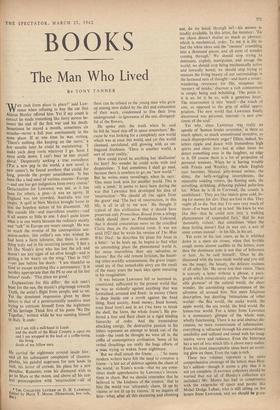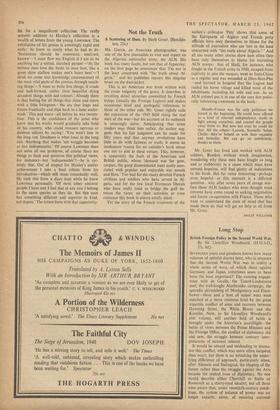The Man Who Lived
BY TONY TANNER
mt rush from place to place?' said Law-
rence when refusing to buy the car that Aldous Huxley offered him. Yet if my count is correct he made something like forty moves be- tween the end of the first war and his death. Sometimes he stayed a month, sometimes six months—never a full year continuously in the same place. If at one time he was writing, 'There's nothing like keeping on the move,' a few months later he could be maintaining: 'I make such deep roots wherever I go. Soon I must settle down. I can't bear to tear myself about.' Desperately seeking a true rootedness (Tut a new peg in the world, a new navel, a new centre'), he found nowhere that could, for long, provide the proper nourishment. 'It has been like a bad meal of various courses—Europe —and one has got indigestion from every course.' Deracination for Lawrence was not, as it has been for others, a pose—it was an agony. If England was too crowded, Australia was too empty. A spell in New Mexico brought home to him the hopeless nature of his discontent. 'All this outside life—and marvellous country—and It all means so little to one. I don't quite know what it is one wants because the ordinary society and "talk" in Europe are weary enough.' He was so much the reverse of the cosmopolitan sen- sation-seeker, this collier's son who wished he had been a farm labourer, that there is some- thing truly sad in his recurring laments. 'I feel a bit like Noah's dove who has lost the ark and doesn't see any signs of an olive bough—and is getting a bit weary on the wing.' That in 1927 —yet just before his death : 'I am thankful to God to escape anything like a permanency.' It is terribly appropriate that the PS to one of his last letters* reads: 'This place no good.'
Explanations for this differ : the sick man's hunt for the sun, the mystic's pilgrimage towards Truth, the artist's flight from people, and so on. Yet the dominant impression given by these letters is that of a preternaturally sensitive man trying to extricate himself from the nightmare of his heritage. Think first of his poem 'We Die Together,' written while he was sunning himself in Italy. It ends: yet I am still a mill-hand in Leeds and the death of the Black Country is upon me and I am wrapped in the lead of a coffin-lining, the living death of my fellow men.
He carried the nightmare around inside him : and all his subsequent complaints of claustro- phobia, his painful eagerness for new lands to visit, his terror of crowds, his plans for a new paradise, Rananim, even his dismayed wish to go to Mars or 'the moon, and above all his cen- tral preoccupation with 'resurrection'—all of
'I' THE COLLECTED LETTERS" OF D. H. LAWRENCE.
Edited by Harry T. Moore. (Heinemann, two vols., Us.) these can be related to the young man who grew up among men dulled by the dirt and exhaustion of their work, condemned to live their lives underground—in ignorance of the sun, disregard- ful of the flowers.
He spoke only the truth when he said he felt he 'must step off in space somewhere.' Be- cause he was looking for a completely new world which was at once this world, and yet this world cleansed, unviolated, still glowing with an un- fingered freshness. 'There is another world, a sort of rarer reality.'
How could travel be anything but 'disillusion' for him? No wonder he could write with real desperation : 'I feel sometimes I shall go mad, because there is nowhere to go, no "new world." ' But he writes more revealingly when he says: `One must look now for another world. This is only a tomb.' It seems to have been during the war that Lawrence first developed his idea of `resurrection'—'We should all rise again from the grave' and 'The fact of resurrection, in this life, is all in all to me now.' He thought it typical of this civilisation that it should have preserved only Prometheus Bound from a trilogy which should show us Prometheus Unbound, that it should concentrate more on the crucified Christ than on the shattered tomb. It was not until 1927 that he wrote his version of The Man Who Died: he describes his plans for Jesus in a letter : 'as he heals up, he begins to find what an astonishing place the phenomenal world is, far more marvellous than any salvation or heaven.' But the odd remote lyricism, the haunt- ing other-worldly sensuousness, the grave imper- sonal joy of that remarkable story are the result of the many years the basic idea spent maturing in his imagination.
It was because Lawrence felt so hemmed in, constricted, suffocated by the present world that he was so violently against anything that was formalised, arrested and fixed: in society ('there is deep inside one a revolt against the fixed thing, fixed society, fixed money, fixed homes, even fixed love') and in art ('we have to break the shell, the form, the whole frame'). He pre- ferred a free and fluid chaos to a rigid binding hierarchy of order. And the tremendous attacking energy, the destructive passion in his letters represent an attempt to break out of the tomb—the tomb he thought we were all in, the coffin of contemporary civilisation. Some of his verbal thrashings are really the huge efforts of a man trying to waken from nightmare.
'But we shall smash the frame. . . .' So many modern writers have felt the need to compose a frame—`a last act of defence against the chaos of the world,' in Yeats's words—that we are some- times made apprehensive by Lawrence's invoca- tions to chaos. But we should remember that he believed in 'the kindness of the cosmos,' that to him the world was 'ultimately chaos, lit up by visions or not lit up by visions.' If we inquire of him—what, after all this shattering and climbing out, do we break through to?—his answer is readily available. In this letter, for instance: `To me chaos doesn't matter so much as abstract, which is mechanical, order. To me it is life to feel the white ideas and the "oneness" crumbling into a thousand pieces, and all sorts of wonder coming through.' We should stop trying to dominate, exploit, manipulate, and savage the world; we should stop being mechanically active and inwardly bored; we should stop trying to ensnare the living beauty of our surroundings in the harassed nets of thought—and learn a tender. wondering reverence for life, recapture the `mystery of intake,' discover a rich contentment in simply being and beholding. 'The point is: it is so, let it be so, with a generous heart.' The resurrection is into `touch'—the touch of awe, as opposed to the grip of wilful appro- priation. The new world that Lawrence finally discovered was personal, internal—`a new con- tinent of the soul.'
Yet why, since Lawrence was really an apostle of 'human tender reverence", is there so much spleen, so much unmotivated invective, so much disproportionate anger? Often, indeed, his letters ripple and dance with tremendous high spirits and sheer fun—but at other times we detect something sour in the laughter, an edge to it. Of course there is a lot of projection of personal tensions. When he is having trouble with Frieda and Weekley, the whole English race becomes 'blasted, jelly-boned swincs, the slimy, the belly-wriggling invertebrates, the miserable sodding rotters, the flaming sods, the snivelling, dribbling, dithering palsied pulse-less lot.' When he is ill in Cornwall, the county is annihilated: 'They are like insects gone cold, liv- ing for money for dirt. They are foul in this. They ought all to die. Not that I've seen very much of them—I've been laid up in bed.' He knew he was like this—that he could turn into 'a walking phenomenon of suspended fury,' that he was `damnably violent,' that sometimes 'when the deep feeling doesn't find its way out, a sort of sneer comes instead'—in his life, in his art.
Yet even in his last years, as he is whittled down to a mere six stones, when that terrible cough seems almost audible in the letters, even then the dominant note is not that of bitterness or hate. As he said himself: 'Once be dis- illusioned with the man-made world and you still see the magic, the beauty, the delicate realness of all other life.' He never lost that vision. There is scarcely a letter without a phrase, a para- graph which miraculously catches 'the un-get-at- able glamour' of the natural world, the sheer wonder, the astonishing sumptuousness of the aliveness all around him. Not mere felicitous description, but dazzling 'intimations of other worlds'—the flea world, the snake world, the apple world, the sea world, the bird world, the lemon-tree world. For a letter from Lawrence is a momentary glimpse of the whole man, wholly functioning. There is no arid abstract dis- cussion, no mere transmission of information : everything is refracted through his extraordinary sensibility and suffused and tinted with his imag- inative verve and radiance. Even the bitterness has a sort of brio which lifts it above mere malice. Even his most unacceptable ideas have an arrest- ing glow on them. Even the rage is rich.
These two volumes represent a far more comprehensive coverage of the letters than Hux- ley's edition—though it seems a pity that it is not yet complete. (Lawrence collectors should be warned that not all of Huxley's collection are included.) Mr. Moore has had to compromise with the exigencies of space and people like Mabel Dodge Luhan, who is still sitting on her letters from Lawrence, and we should be grate-
ful for a magnificent collection. The really notable addition to Huxley's collection is a wealth of letters from the young Lawrence. The exfoliation of his genius is amazingly rapid and early: he knew so surely what he had to do. 'Sentiments should be examined, analysed, known'—'1 must flaw my English if I am to be anything but a stilted, starched parson'—`At the bottom men love the brute in man best, like a great shire stallion makes one's heart beat'—'I think we come into knowledge (unconscious) of the most vital parts of the cosmos through touch- ing things'—'l want to write live things, if crude and half-formed, rather than beautiful dying decadent things with sad colours.' Already there is that feeling for all things that shine and move with a lithe livingness—'the sea that leaps and foams frantically and slips back in a lame under- wash.' This and more—all before he was twenty- four. This is the confidence of the artist who knew that his works ,would gradually take hold of his country, who could reassure nervous or dubious editors by saying: 'You won't lose in the long run. Deadness is what loses in the long run. Anything that makes 'em wriggle becomes at last indispensable.' Of course Lawrence does not solve all our problems, of course there are things to fault and question (his political views, for instance)—but 'indispensable'?—he is cer- tainly that. Out of respect for Huxley's earlier achievement I take a final tribute from his introduction—which still reads remarkably well. He took this from a diary kept while he knew Lawrence personally. 'Of most other eminent people I have met I feel that at any rate I belong to the same species as they do. But this man has something different and superior in kind, not degree.' The letters burn with that superiority.



































 Previous page
Previous page